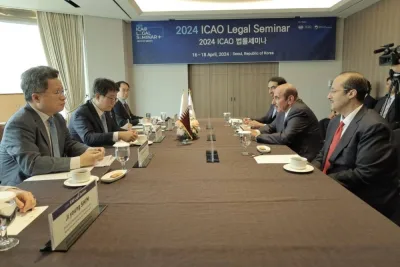The result also provided a history-making moment for HE the Minister of Transport, Jassim Seif Ahmed al-Sulaiti, as under his leadership the country joins the executive committee of the UN org for aviation for the very first time.
The International Civil Aviation Organisation is a specialist agency of the United Nations set up to define international safety, environmental and operating standards for civil aviation. Currently more than 190 countries are members, and aviation rules in each of these follow ICAO standards and recommended practices. Its executive decision-making committee, known as the ICAO Council, is the decision-making branch of the organisation, and just 36 countries are elected to the council at every General Assembly.
Around 177 countries were eligible to vote in Tuesday’s election, the final part of a three-part election to determine the 36-seat council. The State of Qatar was a candidate on Tuesday and was successful following the democratic vote in ICAO’s main assembly hall.
The ICAO Council members are called upon to make key decisions to maintain the safety and regularity of international air transport, one of the most important sectors on earth. It’s important to highlight that Qatar ran in this election as an independent country candidate, and successfully obtained 160 votes, winning a seat to serve.
The Council is a permanent body of the organisation responsible to the Assembly. It is composed of 36 member states elected by the Assembly for a three-year term. In the election, adequate representation is given to states of chief importance in air transport, states not otherwise included but which make the largest contribution to the provision of facilities for international civil air navigation and states not otherwise included whose designation will ensure that all major geographic areas of the world are represented on the Council. The Council also convenes the Assembly.
The Council is ‘decision making’ and has numerous functions. For example, it’s the ICAO Council that, on behalf of the UN body, condemned Belarus on the May 2021 incident in Belarus airspace involving Ryanair Flight FR4978, condemning the actions of the Government of Belarus in committing an act of unlawful interference. It’s also the ICAO Council that urged the Islamic Republic of Iran to expedite the accident investigation into the tragic downing of Ukraine International Airlines flight PS752 on 8 January 2020.
In addition, the Council must submit annual reports to the Assembly; carry out the directions of the Assembly; and discharge the duties and obligations which are laid on it by the Convention on International Civil Aviation (Chicago, 1944). It also administers the finances of ICAO; appoints and defines the duties of the Air Transport Committee, as well as the Committee on Joint Support of Air Navigation Services, the Finance Committee, the Committee on Unlawful Interference, the Technical Co-operation Committee and the Human Resources Committee. It appoints the members of the Air Navigation Commission and it elects the members of the Edward Warner Award Committee.
Another key function of the Council is to appoint the Secretary General.
As one of the two governing bodies of ICAO, the Council gives continuing direction to the work of ICAO. In this regard, one of its major duties is to adopt international Standards and Recommended Practices and to incorporate these as Annexes to the Chicago Convention – the laws of international aviation. The Council may also amend existing Annexes as necessary.
The ICAO win follows an earlier aviation milestone for Qatar. Just last month, the nation obtained the country’s first-ever airspace known as “Doha FIR” through ICAO, a lengthy process of around five years. ICAO is the UN agency with the authority to delegate which country is responsible for the operational control of a given ‘flight information region’, which is known in the industry as an ‘FIR’ – essentially, an airspace area on the map of the skies. The decision itself was unprecedented in the world of commercial aviation, given there are no examples in modern history of the airspace map of the world being officially redrawn.
The author is an aviation analyst. Twitter handle: @AlexInAir
The International Civil Aviation Organisation is a specialist agency of the United Nations set up to define international safety, environmental and operating standards for civil aviation. Currently more than 190 countries are members, and aviation rules in each of these follow ICAO standards and recommended practices. Its executive decision-making committee, known as the ICAO Council, is the decision-making branch of the organisation, and just 36 countries are elected to the council at every General Assembly.
Around 177 countries were eligible to vote in Tuesday’s election, the final part of a three-part election to determine the 36-seat council. The State of Qatar was a candidate on Tuesday and was successful following the democratic vote in ICAO’s main assembly hall.
The ICAO Council members are called upon to make key decisions to maintain the safety and regularity of international air transport, one of the most important sectors on earth. It’s important to highlight that Qatar ran in this election as an independent country candidate, and successfully obtained 160 votes, winning a seat to serve.
The Council is a permanent body of the organisation responsible to the Assembly. It is composed of 36 member states elected by the Assembly for a three-year term. In the election, adequate representation is given to states of chief importance in air transport, states not otherwise included but which make the largest contribution to the provision of facilities for international civil air navigation and states not otherwise included whose designation will ensure that all major geographic areas of the world are represented on the Council. The Council also convenes the Assembly.
The Council is ‘decision making’ and has numerous functions. For example, it’s the ICAO Council that, on behalf of the UN body, condemned Belarus on the May 2021 incident in Belarus airspace involving Ryanair Flight FR4978, condemning the actions of the Government of Belarus in committing an act of unlawful interference. It’s also the ICAO Council that urged the Islamic Republic of Iran to expedite the accident investigation into the tragic downing of Ukraine International Airlines flight PS752 on 8 January 2020.
In addition, the Council must submit annual reports to the Assembly; carry out the directions of the Assembly; and discharge the duties and obligations which are laid on it by the Convention on International Civil Aviation (Chicago, 1944). It also administers the finances of ICAO; appoints and defines the duties of the Air Transport Committee, as well as the Committee on Joint Support of Air Navigation Services, the Finance Committee, the Committee on Unlawful Interference, the Technical Co-operation Committee and the Human Resources Committee. It appoints the members of the Air Navigation Commission and it elects the members of the Edward Warner Award Committee.
Another key function of the Council is to appoint the Secretary General.
As one of the two governing bodies of ICAO, the Council gives continuing direction to the work of ICAO. In this regard, one of its major duties is to adopt international Standards and Recommended Practices and to incorporate these as Annexes to the Chicago Convention – the laws of international aviation. The Council may also amend existing Annexes as necessary.
The ICAO win follows an earlier aviation milestone for Qatar. Just last month, the nation obtained the country’s first-ever airspace known as “Doha FIR” through ICAO, a lengthy process of around five years. ICAO is the UN agency with the authority to delegate which country is responsible for the operational control of a given ‘flight information region’, which is known in the industry as an ‘FIR’ – essentially, an airspace area on the map of the skies. The decision itself was unprecedented in the world of commercial aviation, given there are no examples in modern history of the airspace map of the world being officially redrawn.
The author is an aviation analyst. Twitter handle: @AlexInAir



